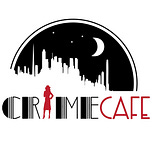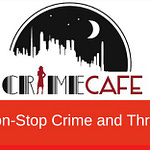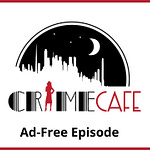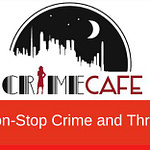Debbi Mack interviews crime fiction writer, Richard Meredith.
Check us out on Patreon: https://www.patreon.com/crimecafe
Debbi (00:54): But first let me put in a good word for Blubrry podcasting.
I’ve been using Blubrry podcasting as my hosting service for my podcast for years, and it’s one of the best decisions I ever made. They provide great service. You’re in complete control of your own podcast. You never have to leave your own website. There is a plugin that you can use to incorporate Blubrry and distribution through your website. So it’s a great service that has taken a lot of the work of podcasting out for me. And I find for that reason that it’s a company that I can get behind 100% and say, you should try this. If you want a podcast, try out Bluebrry. It doesn’t require a long-term contract. It’s just a great company, period. And I am a Blubrry affiliate. So there’s that.
Debbi (02:07): And did I mention that they have free technical support by email, video and phone? Yes, you can actually reach a human being there. I’ll say no more.
Debbi: Hi everyone. We're back for a seventh season of the podcast, which just blows me away. I mean time flies, man. I can't believe I've been doing this for six years. Anyway, as always, I'm blown away also by the variety of backgrounds that people bring into the writing craft. And my first guest for this season is no exception. He has a background in biology. He's worked as a marine scientist and wildlife biologist for the federal government and the private sector. He has also worked on commercial fishing boats. My guest today is author Richard Meredith. Hi, Richard. Thanks so much for being here today.
Richard: Hi, Debbi. Thank you very much for having me. It's a real honor to be with Crime Cafe. And I also want to thank you for posting my guest blog on your website. That was wonderful.
Debbi: Oh, my pleasure to do so. Like I said, you have a very interesting background. What was it you did on commercial fishing boats?
Richard: Well, this may be before your time, but there was during the '70s, there was this controversy about the tuna dolphin controversy where the fishing boats were catching the dolphin and so I was one of the government monitors on those boats. So I did that for about two years.
Debbi: That isn't before my time, by the way.
Richard: And I did that for a couple of years. And then my wife said the next job that comes in on the beach, take it. That was in Kansas City. So I got pretty far from the ocean after that.
Debbi: Well, that's very interesting. I used to work at EPA actually. So I was going to ask you if you did environmental protection.
Richard: Yeah, I was at the Corps of Engineers and we worked with EPA quite a bit. Yeah.
Debbi: Very good, excellent, wonderful. All that Clean Water Act stuff.
Richard: Yeah, exactly.
Debbi: There you go. Had you written any fiction before you wrote The Crow's Nest?
Richard: I wrote a novel called Sky Dance, which was about my experience. Well, it's a novel, but it was based on my experiences in Ecuador when I was working on doing environmental impact studies on petroleum projects down there. And that was self published. I did it through CreateSpace with Amazon. But this was the first one that was published by a publisher.
Debbi: I see. So is this the first in a series or is this a standalone?
Richard: This is a standalone. Yeah. My next three that are still, well, I'm trying to find a publisher, but they're a series. Yeah.
Debbi: Tell us a little about The Crow's Nest. What's it about?
Richard: Well, I say that The Crow's Nest is a crime thriller without police, federal agents, or the military. It's just two men seeking justice against a brutal cartel. It's unique so far in that I think it's the only novel about the use of the crude submarines in the smuggling of cocaine between Columbia and Northern Mexico. I describe it as the mutant spawn of Das Boot and Savages. But in a nutshell, The Crow's Nest is a story about two men, Jonny LeBeau, who's a notorious smuggler, and Chase Brenner, who's an innocent fishermen. And for different reasons, both men get sideways with the vicious Baja cartel and the capo, Fernando Cuervo. They're desperate and are on the run, and they figure that the only chance to survive is to bargain for their lives. But they really don't have any leverage.
The Crow's Nest is a crime thriller without police, federal agents, or the military. It's just two men seeking justice against a brutal cartel. It's unique so far in that I think it's the only novel about the use of the crude submarines in the smuggling of cocaine between Columbia and Northern Mexico.
Richard: So Jonny, who has some inside information about the cartel, conceives a plan to hijack one of the cartel's secret narco submarines, and he figures with 100 million dollars worth of cocaine onboard they can cut a deal. And it's a great idea until the cartel's chief sicario, a man named [inaudible 00:06:46] kidnaps Chase's family. Now things get a little more complicated and Jonny faces the moral dilemma of his life. Ditch Chase, the man who saved him from sure death, or escape with riches beyond his wildest dreams and lose it all, including his life just to save Chase's wife and family. And from there, there's much mayhem on the road to resolution. That's it in a nutshell.
Debbi: That's interesting. It sounds like almost a little bit like an action adventure with psychological thriller thrown in there.
Richard: A little bit. All the characters are flawed in some way.
Debbi: Interesting. Do you feel that your experience on commercial fishing boats contributed in any way toward the writing of this book?
Richard: Yeah, the technical aspects, but there were no personalities like this onboard the boats. They were pretty nice guys overall.
Debbi: Yeah. Let's see. Do you write full-time or are you still employed?
Richard: No, I'm retired. I retired about three years ago. And I write, well, full time when I'm not babysitting with the grandkids. But I try to get in a couple, three or four hours a day. But I think as I told you in my interview, that I'm a lazy writer. I have to wait for the mood to hit me. I'm always taking notes and things, but to sit down and put it together, it takes me awhile.
Debbi: It does take a certain amount of discipline though, doesn't it?
Richard: Yeah, It does. I always tell friends it's the hardest thing to start and the easiest thing to quit, but in between it's a lot of fun.
Debbi: Yeah. There's that. I think that's a good observation there. Between the hard times, it can be fun. Do you have a particular, you don't have a particular routine I take it for writing? Or is there a time of day or something- ?
Richard: I'm pretty much a morning person. If I can get up, have a cup of coffee and go to work right away, I'm good for about two or three hours doing it that way. Then after that it's on the web, doing filing, or all the menial labor after that. But every once in a while you get, something comes into your head and you have to write down the note and you wait, use it for the next morning.
I'm pretty much a morning person. If I can get up, have a cup of coffee and go to work right away, I'm good for about two or three hours doing it that way.
Debbi: Absolutely. Yeah. Get those ideas while they're fresh. How would you describe your writing to someone who's never read your books?
Richard: Describe the writing?
Debbi: Yeah.
Richard: It's a crime thriller, a lot of action adventure. I think that would be it. I see a movie script in everything I write, but no one wants to buy a script yet. But there's a lot of action. Yeah.
Debbi: Interesting. Are the endings noirish or more upbeat?
Richard: Upbeat.
Debbi: Okay. So good guys win?
Richard: Yeah, I like-
Debbi: Or better guys win maybe.
Richard: Sometimes someone may get away, but the good guys win in the end.
Debbi: Cool. Let's see. You travel a lot you said. Do you set your stories in the places that you visit? And how much does location, how much of a part does location play in your writing?
Richard: I think setting is very important to me almost because it forms a character, where they're at. And I've been fortunate in my career to travel a lot of different places and have a lot of different experiences. And so far, each one of them has contributed to one of my books. So I think it's very important for me for setting.
I think setting is very important to me almost because it forms a character, where they're at. And I've been fortunate in my career to travel a lot of different places and have a lot of different experiences.
Debbi: It's almost as if the choice of that setting is a function of character because only a certain type of character would choose to do these jobs.
Richard: Right. In fact, my latest one I'm working on is about this woman who is a hardhat diver. And I had an experience working with hard-hat divers in the Sacramento River where they're recovering pipelines. And I have her uncovering this strong box that was lost during the California gold rush 150 years ago. So that setting, having this hard hat diver, then how did she get there? That's not typically an occupation you find a lot of women in, but that really took the whole story away right there.
Debbi: Yeah. I would think so. And when is this taking place, with the hardhat diver?
Richard: Oh, this is contemporary.
Debbi: Contemporary, right. Okay, cool. What writers would you say have most inspired your work?
Richard: It changed. I think initially when I was a kid, I saw some James Bond movies and started reading all of Ian Fleming. I think one summer I read everything. And then the mid '70s, I was really into John D. MacDonald's Travis McGee series. And then Michael Crichton has always been a favorite because of the mix of science, thriller, and novelty. But I'm pretty much an in genre reader. I'm reading a lot at Gillian Flynn, Tom Clancy, Vince Flynn, Brad Thor, Michael Connelly, Robert Crais, those types of things. But I think my favorite of all is really Daniel Silva.
Debbi: Hmm. Now that's one writer I haven't read actually.
Richard: Oh, he's just, yeah. I'm up to date on his latest one too. Yeah.
Debbi: Interesting. I have to make a note of that.
Richard: I just started reading Owen Laukkanen, I never know how to pronounce his name, Deception Cove by Owen Laukkanen.
Debbi: Yeah. I know. He's good. I've read his stuff. Yeah.
Richard: Also I just got, I'm reading a couple of novels by James, I'll butcher his name too, [inaudible 00:13:04]. It's interesting because he's always writing about Sacramento where I'm at.
Debbi: Oh, cool. I used to live in Fresno.
Richard: Oh, there you go. Okay.
Debbi: Fresno and Merced actually.
Richard: I've got friends in both areas. Yeah.
Debbi: I know the Central Valley. Although it took moving to Maryland and seeing Grapes of Wrath for me to understand what the term Oakie meant. I was like, "Oh, that's what they were talking about all that time." People would say, "Oakie." I was like--
Richard: Well, you're missing our 100 degree temperature right now. So you're--
Debbi: Oh, what a shame. That's okay. We have super humidity to look forward to here in Maryland.
Richard: Well, you know the Central Valley. It's hot.
Debbi: Oh yeah. Hot, like an oven hot. I remember opening the door and feeling like a blast furnace coming at me. What would you say is the best part of writing fiction and say the hardest part?
Richard: The hardest part is finding that right word. You know it's out there. It's that putting together that sentence. And one day it'll be, it sounds like the greatest thing ever written. The next day you read the same thing and say, "Oh my God, what have I done?" But I think it's that back and forth of trying to just formulate that idea, that sentence, that paragraph, that page into a cohesive unit. That's the fun part. It's the puzzle.
The hardest part is finding that right word. You know it's out there. It's that putting together that sentence. And one day it'll be, it sounds like the greatest thing ever written. The next day you read the same thing and say, "Oh my God, what have I done?"
Debbi: Mm-hmm (affirmative). So that's the fun part. So what's the hard part?
Richard: Doing it over and over again.
Debbi: And making it work over and over again.
Richard: Yeah, and making it cohesive. I'm in this critique group and our leader said one time said, "We're not writers, we're rewriters." And that's really the case. It's just back and forth, back and forth.
Debbi: Absolutely. Every writer is a rewriter. And what advice would you give to anyone who's interested in writing fiction?
Richard: Write what you know, and people that you know, and experiences you've had. And I wouldn't stick to that, but that's a good place to start because you know where that is, it's personal. And then you can go out from there. But I think that a situation you know, a setting you know, and a type of personality you know, and build your story around that. I think if you try to go too far out, start writing a novel about Icelandic literature, you may be too far out. You've got to get something that's closer to home.
Write what you know, and people that you know, and experiences you've had. And I wouldn't stick to that, but that's a good place to start because you know where that is, it's personal. And then you can go out from there.
Debbi: Absolutely. Unless of course, you've lived in Iceland.
Richard: Unless you're from Iceland. Yeah.
Debbi: Let’s see. Where can readers find you online?
Richard: My website is Richard W Meredith, M-E-R-E-D-I-T-H.com. I also have a Facebook page, Richard W Meredith. Just look that up and that's my author's page. And my email address is rmeredith@comcast.net. I can be reached through any of those.
Debbi: Excellent. And you're on various social media I assume.
Richard: I'm learning social media. Say that. That's what the other thing I would have a new writer learn is, and we've learned this during COVID, that I had this big marketing plan last year. My book came out in May and all of a sudden, you can't have book signings, you can't travel to conferences. And so you're pretty reliant on social media. And so I would say develop a following somehow, right away. Even before the book comes out. Get online, get going. Find some influencers.
Debbi: Even if it's just to start a blog.
Richard: Even if it's to start a blog. Yes.
Debbi: Sometimes I think we undervalue the value of a blog.
Richard: Oh, I think blogs, yeah... I must go through, I don't know how many I read.
Debbi: I'm glad to hear somebody is still reading them because somebody else out there was saying, "Oh, I don't read blogs anymore. I just listen to podcasts." And I was like, "What?" How can you... I don't know. Well, I mean, some people are like that I guess. It depends on your taste. But I noticed that among your hobbies, you listed videography and guitar. So you're a musician?
Richard: Well, I was in a band in high school. Everyone was in a band in high school. But I was so proud when I learned my fourth chord on the guitar. So I've been playing it for 40 years and not making much headway, but I love it. It's one of those things that relaxes me. Yeah.
Debbi: And you take video also?
Richard: I do. I started very innocently. I was going across, I bought a car from a friend of mine who had a dealership back in Michigan. And my wife and I were driving across the country and we said, "Why don't we stop at different ballparks along the way?" So we started at Tiger Stadium and I think we went to St. Louis. Then we went to Dallas and then Arizona and then Anaheim. And each one, we tried to shoot a three to five minute video of the city we're in, a little bit of the ballpark, a little bit of the game. We have to taste the hot dog to see how good it is. And we put those out on YouTube. But they're just really more for friends than anything else. But it got a lot better over the years.
Debbi: Well, yeah, I, myself am into video a little bit. I play around with it. And I actually did do a video of a trip that my husband and I took to Pittsburgh basically to see the game, the baseball game in Pittsburgh. But we did all these other things too while we were there. So I included it in the video. It was fun.
Richard: It's a great stadium to go to.
Debbi: It is. Yeah, it's fantastic. It's a lot of fun. Let's see. Is there anything else you'd like to add before we finish up?
Richard: No, but I just want you to know that I do have that little sampling of my next novel, Maskirovka, that's available at my website for anyone who wants to read a few chapters of that.
Debbi: What's that about?
Richard: Well, that is about Russian collusion in US elections where illegal Petro-Rubles are funneled, laundered through seemingly legitimate foundations into political campaigns. And it gets to be a little interesting how money can get into politics illegally. And so I was looking at that.
Debbi: Wow. This all sounds very timely and interesting. Fascinating.
Richard: Yeah, so that's what that one's about. Maskirovka is the Russian science of deception and how they move the shell around. So yeah.
Debbi: Interesting. Well, it sounds fascinating. I'm glad you were here today and thank you so much for being on with us.
Richard: If I can just make the, The Crow's Nest is available both at Amazon and Barnes and Noble. Have to put that pitch in at the end.
Debbi: Absolutely. Very good. Well done.
Richard: Well, thank you very much, Debbi. I appreciate the opportunity.
Debbi: Well, I appreciate your being here and you're very welcome. Thanks. And I should also mention that I'm offering all three of my indie published audiobooks for half price throughout all of July, up until the 30th I think. I'll include a link below this video, as well as with the podcast notes. So if you enjoy listening to books and you would like to try out my audio books, give them a look and take a listen to the sample. That's it for my commercial. They are also Patreon supported. I should mention that. Our next guest on the show will be August Norman. So I hope to see you in two weeks and in the meantime, happy reading.
All shares are greatly appreciated! Thanks!

















Share this post